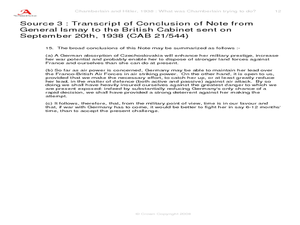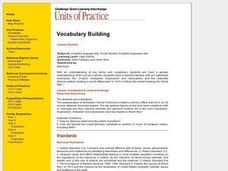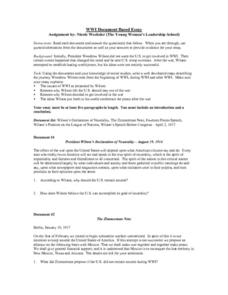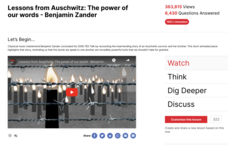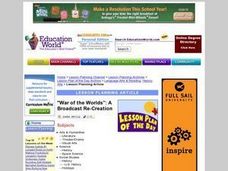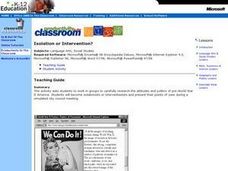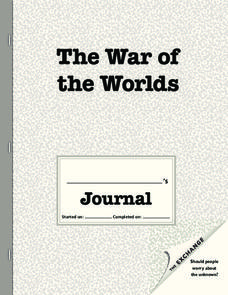Curated OER
Chamberlain and Hitler, 1938--What Was Chamberlain Trying To Do?
Explore events prior to World War II. Learners view replicas of authentic photographs and hand written documents representing the viewpoints of Adolf Hitler and Neville Chamberlain. They discuss alternate viewpoints, consider historical...
Curated OER
Vocabulary Building - World War I
Students study the definitions of militarism, imperialism, and nationalism, and the significant individuals involved in the world alliance system prior to 1914. They examine the events that lead to World War I.
Curated OER
Compare and Contrast Night to Life is Beautiful
After reading Elie Wiesel's Night, watching the movie Life is Beautiful, and researching World War II, class members write a comparison essay on the book and film. This includes a prior knowledge activity, discussion in whole and small...
PBS
Family History: Treasure Troves
It's time for show and tell! Scholars investigate historical artifacts to determine what secrets they reveal about the time periods they represent. They then research their own personal artifacts, as well as those from World War I.
Curated OER
Dulce et Decorum est by Wilfred Owen
It is entirely fitting and proper that Wilfred Owen’s powerful “Dulce et Decorum Est” is the poem used for an exercise in close reading, discussion, analysis, and argumentative writing. Class members discuss focus questions in pairs,...
EngageNY
Inferring Author’s Opinions and Writing Opinion Statements: Journalists’ Opinions about Segregation Post–World War II (Promises to Keep, Pages 22–25)
Let's play ball! Scholars summarize information from Promises to Keep about segregation in professional baseball after World War II. They then listen as the teacher reads pages 22-25 aloud. Pupils write the gist in their journals of the...
Curated OER
The Road to World War II
Students research the orgins and early events of World War II using online and off line resources. They conduct an interview with a local World War II veteral and present their findings to the class.
Curated OER
The War: Japanese Americans and Internment
Students examine the experiences of Japanese-Americans at the beginning of World War II in America. After watching an excerpt from "The War", they answer reflection questions about the Japanese being put into internment camps. In groups,...
Curated OER
My Secret War: The WWII Diary of Madeline Beck: Lesson 11
Fifth graders explore world history by participating in a class game. In this propaganda lesson, 5th graders identify Madeline Beck and the role women played during World War II. Students create fictitious propaganda posters and...
Indiana University
Literature of Asia and the Middle East: "A Sound of Hammering" by Dazai Osamu
Dazai Osamu’s short story, “A Sound of Hammering” is the focus of a three-day investigation of modern Japanese literature and life in post-World War II Japan. The events in Osamu’s story mirror those in his own life, and give a...
Curated OER
Pre-Reading Strategy Instructional Routine: Maus I and II
Vladek's attitudes are difficult for many young learners to understand. Prepare your class for the events represented in Art Speigelman's graphic novel with a pre-reading activity that has them read articles about and interviews with...
Curated OER
It's Up for Debate
Students work together to research issues surrounding World War II. They review the decisions that were made at the time. They participate in a debate and how those decisions maintained world peace.
Curated OER
World War One Weapons- Word Search
In this word search worksheet, learners study 14 words in a word bank that pertain to weapons used in World War I. Students find the words in a word search.
Curated OER
WWI Document Based Essay
Learners read various primary source documents on World War I. After reading each document, they answer discussion questions. Using the internet, they identify the causes of World War I as layed out by President Wilson and his reasons...
Constitutional Rights Foundation
The Cold War: How Did It Start? How Did It End?
What is the difference between a Cold War and a Hot War? Scholars research the beginning of the Cold War. They analyze diary entries as well as excerpts from various events during the 45-year standoff. To finish, they prepare final...
Maryland Department of Education
The Concept of Identity Lesson 8: Propaganda in Visual Media
Visual and print propaganda are featured in a instructional activity that asks readers of A Separate Peace to examine the techniques used in propaganda from World War I, World War II, presidential elections, and in the novel.
Curated OER
The Battle of Somme
In this newspaper template worksheet, students create news stories that might have been on the front page of a newspaper following the World War I Battle of Somme.
Curated OER
In Flanders Fields and Comprehension Questions
Especially appropriate for classroom use on Veteran's Day or Remembrance Day, this poetry activity asks learners to read Lieutenant Colonel John McCrae's famous poem "In Flanders Fields." After reading, class members answer comprehension...
Curated OER
An Introduction to the Literature of World War I
Twelfth graders use internet research to gain an introduction to the Literature of World War I and gain an understanding of the essential humanity of soldiers on both sides of the conflict, and gain background information for the...
TED-Ed
Lessons from Auschwitz: The Power of Our Words
Some words are best left unspoken. Words matter, according to Benjamin Zander, conductor, teacher, and lecturer. To illustrate his point, Zander recounts a story told to him by a survivor of Auschwitz. As a result of her experience this...
National Endowment for the Humanities
The Rise and Fall of Joseph McCarthy
"I have here in my hand . . ." The war against Communism and Joseph McCarthy’s place in it are the focus of a series of lessons examining postwar America from 1945-1954. Joseph McCarthy takes center stage in this, the final lesson of the...
Curated OER
"War of the Worlds": A Broadcast Re-Creation
Why did Orson Welles' 1938 Broadcast of a adaptation of H.G. Wells' The War of the Worlds cause such a panic? To answer this question, class members listen to the original broadcast and research the panic that resulted. They then engage...
Curated OER
Isolation or Intervention?
Students research the attitudes and politics of pre-World War II America. They become isolationists or interventionists and present their points of view during a simulated city council meeting.
Curated OER
The War of the Worlds
Read The War of the Worlds with your class. Then you can enhance the reading experience through the use of these worksheets. Keeping track of reading, recording reader response, and various activities pertaining to the book are included....
Other popular searches
- World War Ii
- World War I and Ii
- Causes of World War I
- Causes World War Ii
- World War Ii Map
- World War Ii Holocaust
- World War Ii Battles
- Post World War Ii
- Propaganda World War Ii
- Causes of World War Ii
- World War I Causes
- World War Ii Newspaper


